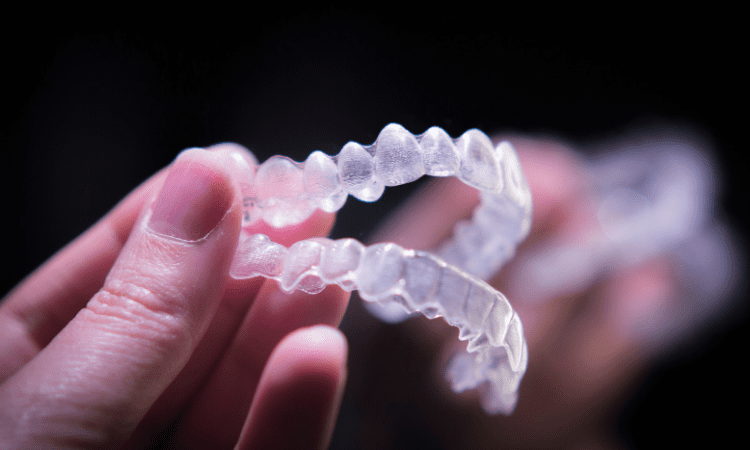Clear aligners, such as Invisalign, have become a popular choice for people looking to straighten their teeth without the look of traditional metal braces. They are comfortable, removable, and nearly invisible, making them ideal for both teens and adults. However, just because you’re straightening your teeth with aligners doesn’t mean you can neglect your oral health. In fact, during orthodontic treatment, it’s even more important to take care of your teeth, and fluoride can play a big role in keeping your smile healthy while you wear clear aligners.

What Are Clear Aligners?
Clear aligners are custom-made plastic trays that gradually move your teeth into the desired position. Unlike metal braces, aligners are removable, so you can take them out when you eat, brush, or floss. They work by applying gentle pressure on your teeth to shift them into better alignment over time. Every few weeks, you switch to a new set of aligners as your teeth continue to move.
Clear aligners are popular because they are more discreet than braces, making them a great choice for people who don’t want the noticeable look of metal brackets and wires. However, while they offer a lot of convenience, it’s important to maintain good oral hygiene during your treatment to avoid issues like cavities and tooth decay.
Why Oral Care Is Important During Aligners
One of the challenges of wearing clear aligners is that they create a closed environment around your teeth. Since aligners fit snugly over your teeth, it’s easier for food particles and bacteria to get trapped between the trays and your teeth. This can lead to plaque buildup and increase the risk of tooth decay and gum disease if you don’t clean your teeth properly.
In addition, aligners must be worn for most of the day—typically around 20 to 22 hours—which means your teeth are covered for long periods. Without regular brushing, flossing, and proper oral care, harmful bacteria can thrive, causing problems like bad breath, cavities, and gum inflammation.
How Fluoride Helps Protect Your Teeth
Fluoride is a key ingredient in protecting your teeth during clear aligner treatment. This naturally occurring mineral helps strengthen your tooth enamel, making it more resistant to the acids produced by bacteria. These acids are responsible for breaking down the enamel and causing cavities. Fluoride also helps remineralize your teeth, repairing the early stages of tooth decay before it becomes a bigger problem.
Using fluoride toothpaste and mouth rinses can make a big difference when you’re wearing aligners. The fluoride in these products helps coat your teeth and protect them from decay, even when aligners cover your teeth. Because clear aligners trap bacteria and food particles, fluoride is essential in keeping your enamel strong and healthy during treatment.
Frequently Asked Questions
Can clear aligners treat rotated teeth?
Clear aligners can effectively correct mild to moderately rotated teeth by applying gradual pressure to move them into proper alignment. Severe tooth rotation may require traditional braces or additional orthodontic techniques. Your dentist will evaluate the case’s complexity to determine if aligners are suitable.
How often do I need to switch to a new set of aligners?
Most clear aligner systems require you to switch to a new set every one to two weeks. Each set is slightly adjusted to continue moving your teeth toward the desired position. Your orthodontist will provide a personalized schedule based on your treatment plan.
Are clear aligners safe for patients with gum disease?
Patients with gum disease can use clear aligners, but you must treat and stabilize the condition first. Healthy gums are essential for successful orthodontic treatment. Your dentist or orthodontist will monitor your gum health throughout the process.
Are professional fluoride treatments better than over-the-counter products?
Professional fluoride treatments contain higher concentrations of fluoride than over-the-counter products. These treatments provide a stronger and more immediate protective effect for the teeth. While at-home fluoride toothpaste and rinses are essential for maintenance, we know professional treatments offer additional benefits for cavity prevention.
Can fluoride treatments reverse early tooth decay?
Yes, fluoride treatments can help reverse early stages of tooth decay. Fluoride strengthens weakened enamel and promotes remineralization, making it harder for cavities to develop. While it can’t repair fully formed cavities, it’s highly effective in preventing further damage.
Does fluoride treatment work on children with baby teeth?
Yes, fluoride treatments work effectively on children’s baby teeth. These treatments help strengthen tooth enamel, prevent cavities, and protect primary teeth until permanent teeth emerge. Pediatric dentists recommend early fluoride treatments to establish good oral health habits and reduce the risk of tooth decay in young patients.
Clear aligners are a convenient and effective way to straighten your teeth, but they require special attention to oral care to keep your smile healthy. Fluoride is an essential part of that care, helping to strengthen your enamel and prevent tooth decay while you wear aligners. By brushing and flossing regularly, using fluoride toothpaste and mouthwash, and keeping your aligners clean, you can protect your teeth and enjoy the benefits of a straighter, healthier smile. Always follow your dentist’s advice for the best results during your clear aligner treatment.
